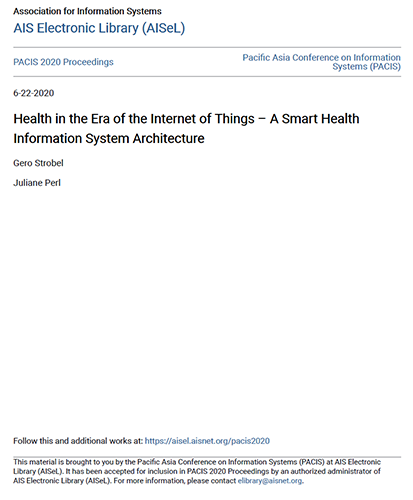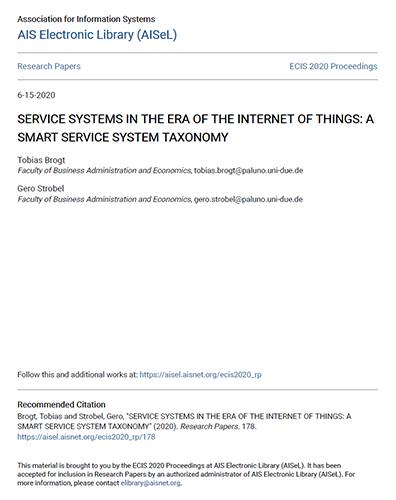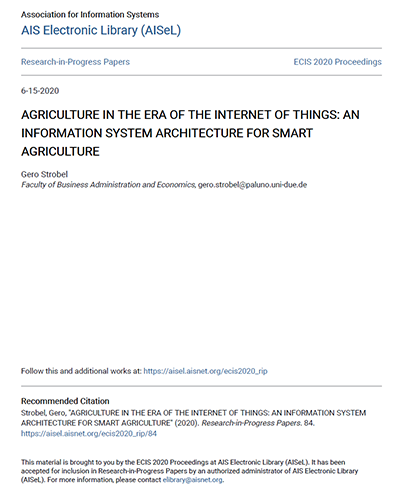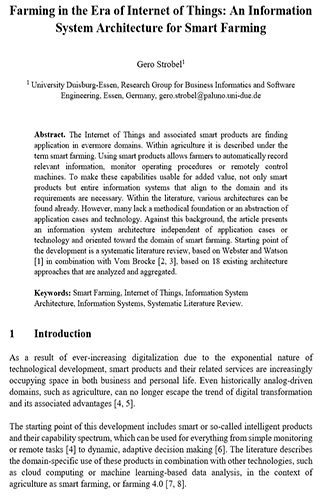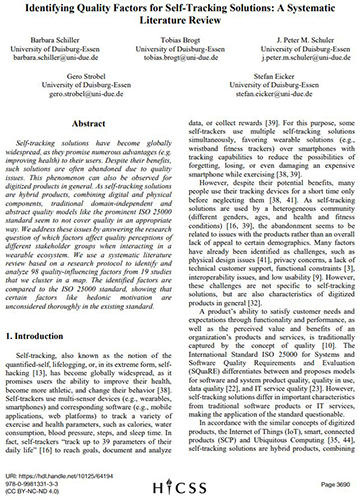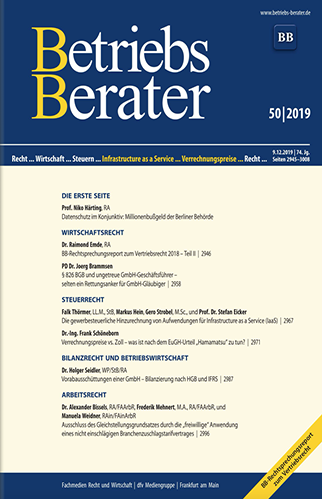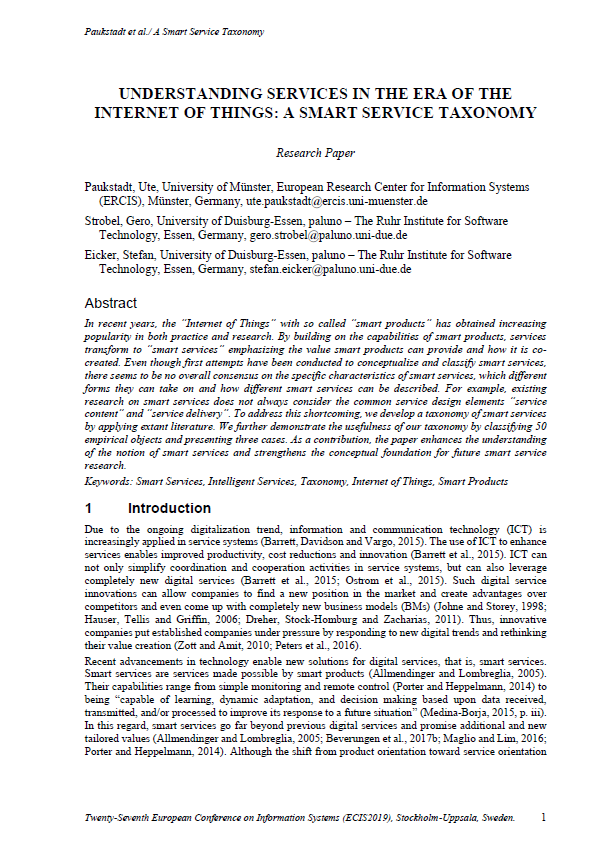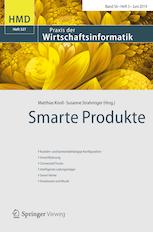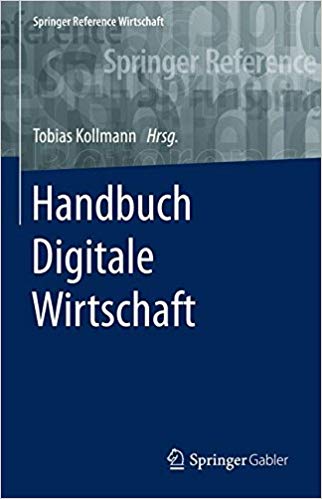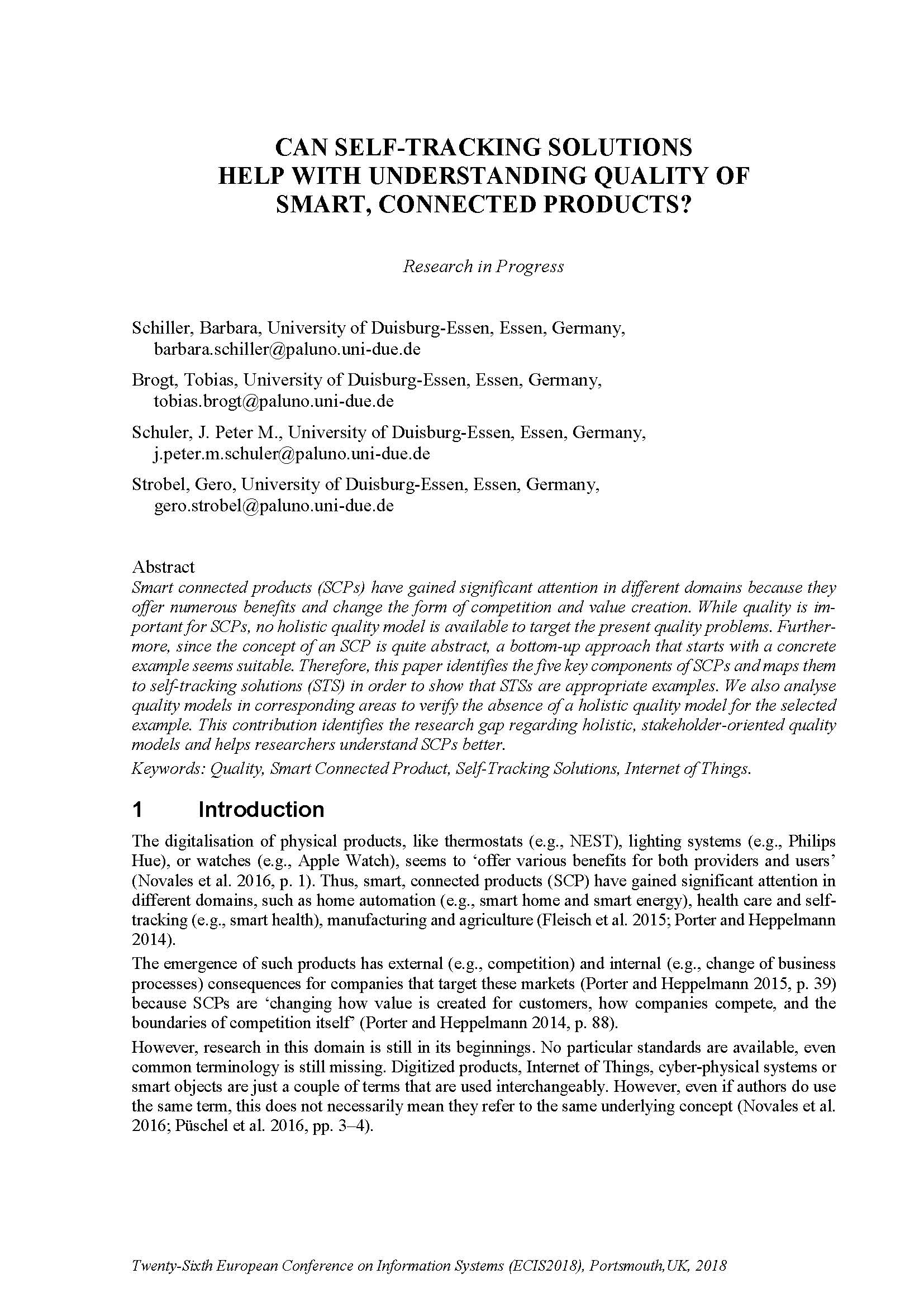Team

Senior Academic Staff
Dr. Gero Strobel
- Room:
- R09 R02 H47
- Phone:
- +49 201 18-34942
- Email:
- gero.strobel (at) uni-due.de
- Consultation Hour:
- By agreement
- Author Profiles:
- Google Scholar
- ResearchGate
- Social Media:
- Address:
- Universität Duisburg-Essen, Campus Essen
Fakultät für Informatik
Lehrstuhl für Wirtschaftsinformatik und Softwaretechnik
Universitätsstr. 9
45141 Essen
Curriculum Vitae:
- December 2017 - August 2021: Research Assistant at the Chair of Business Informatics and Software Engineering (Chairholder: Prof. Dr. Stefan Eicker) at the University of Duisburg-Essen
- August 2021 - December 2021: Postdoctoral Researcher at the Chair of Business Informatics and Software Engineering (Chairholder: Prof. Dr. Stefan Eicker) at the University of Duisburg-Essen
- Since January 2022: Assistant Professor and Deputy Chair of the Chair of Business Informatics and Software Engineering (Chairholder: Prof. Dr. Stefan Eicker) at the University of Duisburg-Essen
Honours and Awards:
Science Prize of Sparkasse Essen 2021 for the cumulative dissertation 'Towards a Multi-perspective Conceptual Approach for IoT-based Information Systems.'
Dissertation Prize of the University of Duisburg-Essen 2021 for the cumulative dissertation 'Towards a Multi-perspective Conceptual Approach for IoT-based Information Systems.'
Best Paper in Track Award at the 42nd International Conference on Information Systems (ICIS) 2021 for the publication 'Achieving Sustainability with Artificial Intelligence—A Survey of Information Systems Research' in the track 'Societal Impact of IS.'
Nominated for the Best Paper Award at the 42nd International Conference on Information Systems (ICIS) 2021 for the publication 'Achieving Sustainability with Artificial Intelligence—A Survey of Information Systems Research.'
Nominated for the Claudio Ciborra Award for Most Innovative Paper at the 29th European Conference on Information Systems (ECIS) 2021 for the publication 'Honey, I Shrunk the Internet of Things: An Internet of Nano-Things Taxonomy.'
Nominated for the Best Paper Award at the 53rd Hawaii International Conference on System Sciences (HICSS) 2020 for the publication 'Identifying Quality Factors for Self-Tracking Solutions: A Systematic Literature Review.'"
Fields of Research:
- Intelligente Information Systems
- Human-Centered & Generative AI
- Internet of Things (IoT) & Smart Services
Publications:
- Banh, Leonardo; Rex, Alexander; Strobel, Gero; Urbach, Nils: Hiring Tomorrow's Talents: How Generative Artificial Intelligence Transforms Human Resources Recruitment. In: Proceedings of the 59th Hawaii International Conference on System Sciences (HICSS). Maui, Hawaii, USA, 2026. AbstractDetailsFull textCitation
The global talent shortage has become a universal challenge, prompting practitioners and researchers to explore digital innovations as potential solutions for acquiring the right talents. However, the role of emerging technologies like generative artificial intelligence (AI) in human resources (HR) remains largely uncharted territory. This article investigates generative AI's transformative potential to augment recruiters' daily operations. Through a qualitative interview study, we derive and illuminate the opportunities of generative AI within the recruitment domain, shedding light on its promising opportunities but also addressing inherent challenges. The findings of this study propose a theoretical model of generative AI in recruitment and how it empowers recruiters in their daily tasks to recruit tomorrow's talents.
- Holldack, Florian; Banh, Leonardo; Strobel, Gero: Agentic information systems. In: Electronic Markets, Vol36 (2026). doi:10.1007/s12525-025-00861-0AbstractDetailsCitation
Recent advancements in artificial intelligence (AI) have catalyzed the emergence of agentic information systems (IS), which exhibit autonomous behavior and advanced cognitive capabilities. Unlike traditional IS, which functioned primarily as reactive tools supporting humans, agentic IS can make decisions independently, act in unstructured environments, and even delegate tasks to humans. This paradigm shift fundamentally transforms the human-IS relationship, questioning the long-standing assumption of human agentic primacy in IS research and practice. In this article, we provide a conceptual overview of agentic IS, delineating their defining characteristics and situating them within the broader evolution of IS. We introduce key archetypes of agentic IS, explore novel patterns of delegation and interaction between humans and machines, and discuss the socio-technical implications of these developments. Furthermore, we highlight the challenges and risks associated with integrating agentic IS from an individual, organizational, and societal perspective, emphasizing the need for nuanced understanding to harness the potential while addressing emerging complexities.
- Holldack, Florian; Banh, Leonardo; Strobel, Gero: Synthetic Conversations, Real Insights: Towards Realistic User Simulations with Generative Agents. In: Ais (Ed.): Proceedings of the 46th International Conference on Information Systems (ICIS). Nashville, Tennessee, USA, 2025. AbstractDetailsFull textCitation
The rise of generative AI and large language models (LLMs) has sparked interest in applying generative agents to simulate users in conversational recommender system (CRS) evaluations. While CRS rely on user perception for success, traditional user studies are costly and time-intensive. Existing simulation approaches lack interaction depth and user-centric evaluation. This study addresses these gaps by leveraging LLM-based generative agents to conduct scalable, subjective CRS assessments. We present a comparative study where 200 generative agents and 50 human participants interact with a prototypical agentic CRS and evaluate their experience using a structured questionnaire. Results indicate that generative agents approximate human-like behavior and subjective assessments at the macro-level, despite granular precision limitations, offering an alternative to traditional user studies. Our findings advance research on CRS evaluation by demonstrating how agentic simulations can support human-aligned assessments of socio-technical systems and open new avenues for applying Generative AI in user-centered decision support.
- Banh, Leonardo; Tran, Tuan Khang; Strobel, Gero: An Affordance Perspective on Generative AI in Enterprise Architecture. In: IEEE Access, Vol13 (2025), p. 192711-192730. doi:10.1109/ACCESS.2025.3631323AbstractDetailsCitation
Generative artificial intelligence (GenAI) has emerged as a transformative technology capable of creating novel content across multiple formats. Its rapid advancement fuels innovations and implications for various fields, including the unexplored domain of enterprise architecture. This study investigates the potential applications of generative AI in enterprise architecture through semi-structured expert interviews, analyzed using the theoretical lens of affordance theory. The research identifies four key affordances that generative AI offers enterprise architects: information research and synthesis, text generation and refinement, insight generation and decision support, and architectural content creation. The findings reveal that generative AI functions as a collaborative partner for enterprise architects, providing information and inspiration that, when combined with professional knowledge and expertise, enables the creation of high-quality and innovative enterprise architecture content. This technology shows promise in enhancing productivity, efficiency, and effectiveness in enterprise architecture practices.
- Laufer, Jan; Banh, Leonardo; Strobel, Gero: Bridging Mind and Matter: A Taxonomy of Embodied Generative AI. In: AIS (Ed.): Wirtschaftsinformatik 2025 Proceedings. Münster, Germany, 2025. DetailsCitation
- Möllmann, Ben; Banh, Leonardo; Laufer, Jan; Strobel, Gero: Trust Me, I’m a Tax Advisor: Influencing Factors for Adopting Generative AI Assistants in Tax Law. In: AiS (Ed.): Wirtschaftsinformatik 2025 Proceedings. Münster, Germany, 2025. DetailsCitation
- Paeplow, Johanna; Schoormann, Thorsten; Möller, Frederik; Strobel, Gero: AI startups for good: A taxonomy and archetypes of sustainable business models. In: Journal of Cleaner Production, Vol520 (2025). doi:10.1016/j.jclepro.2025.146144AbstractDetailsCitation
Artificial Intelligence (AI) empowers startups to have a positive impact on personal and professional lives. Given that power, research on how business models utilize AI to contribute to sustainability is needed. Knowledge about various design options can help business model developers minimize unnecessary efforts and mitigate potential risks. This paper addresses this issue through twofold contributions: First, we provide a taxonomy of AI startup business models for good. Based on the analysis of 100 real-world instances, the taxonomy captures how AI is currently used in startups to achieve sustainability value. This helps scholars and practitioners be aware of and navigate key characteristics of such business models, as well as understand the boundaries of the overarching design solution space. Second, we present five archetypical configurations: AI environmental analyser, AI healthcare improver with patient data, AI product manufacturer for farming and grocery, AI surveillant and reporter of customer-provided data, and AI Energy Improver. These archetypes reflect common business model characteristic combinations that practitioners can use to develop or redesign their businesses. Researchers can further examine these archetypes to generate new insights, for instance, by evaluating their success and contributions to sustainable development.
- Chrarid, Soufian; Holldack, Florian; Woroch, Robert; Strobel, Gero: Developing Design Principles for VR Training Systems in Industrial Assembly and Maintenance. In: AiS (Ed.): 31st Americas Conference on Information Systems, AMCIS 2025. Montreal, Canada, 2025. DetailsCitation
- Banh, Leonardo; Stangl, Fabian J.; Strobel, Gero; Riedl, René: Exploring the NeuroIS Potential for Generative Artificial Intelligence: Findings from a Literature Review. In: Davis, Fred D.; Riedl, René; vom Brocke, Jan; Léger, Pierre-Majorique; Randolph, Adriane B.; Müller-Putz, Gernot R. (Ed.): Information Systems and Neuroscience. NeuroIS Retreat 2025, Vienna, Austria. 1st Edition. Springer, Cham, 2025, p. 11-25. doi:10.1007/978-3-032-00815-2_2DetailsCitation
- Banh, Leonardo; Stangl, Fabian J.; Strobel, Gero; Riedl, René: The Role of Generative Artificial Intelligence in the NeuroIS Research Process: Applications and Opportunities. In: Davis, Fred D.; Riedl, René; vom Brocke, Jan; Léger, Pierre-Majorique; Randolph, Adriane B.; Müller-Putz, Gernot R. (Ed.): Information Systems and Neuroscience. NeuroIS Retreat 2025, Vienna, Austria. 1st Edition. Springer, Cham, 2025, p. 27-43. doi:10.1007/978-3-032-00815-2_3DetailsCitation
- Banh, Leonardo; Strobel, Gero: The Sound of Progress: Investigating the Representation of Artificial Intelligence in Music. In: Beverungen, D.; Lehrer, C.; Trier, M. (Ed.): Conceptualizing Digital Responsibility for the Information Age. WI 2023. Lecture Notes in Information Systems and Organisation. Springer, Cham, 2025, p. 169-178. doi:10.1007/978-3-031-80119-8_11AbstractDetailsCitation
The role of artificial intelligence in daily life is constantly advancing and has become an important topic of discussion. With music and its lyrics being a vehicle to express topics of society, this paper investigates how artificial intelligence is perceived by musicians and reflected in their songs. By analyzing the lyrics of over 1200 songs over three decades, this work applies sentiment analysis to extract polarities and emotions. The results provide insights into how musicians view and reflect the impact of artificial intelligence on society and how this is reflected in their song texts. The findings show an increase in songs mentioning artificial intelligence-related terms, with a trend of more songs implying negativity, such as anger. However, minor increases in positive emotions indicate musicians’ ambivalent views on hopes and fear of artificial intelligence.
- Banh, Leonardo; Holldack, Florian; Strobel, Gero: Copiloting the Future: How Generative AI Transforms Software Engineering. In: Information and Software Technology, Vol183 (2025), p. 107751. doi:10.1016/j.infsof.2025.107751AbstractDetailsCitation
Context
With rapid technological advancements, artificial intelligence (AI) has become integral to various sectors. Generative AI (GenAI) tools like ChatGPT or GitHub Copilot, with their unique content creation capabilities, pose transformative potential in Software Engineering by offering new ways to optimize software development processes. However, the integration into current processes also presents challenges that require a sociotechnical analysis to effectively realize GenAI's potential.
Objective
This study investigates how GenAI can be leveraged in the domain of Software Engineering, exploring its action potentials and challenges to help businesses and developers optimize the adoption of this technology in their workflows.
Method
We performed a qualitative study and collected data from expert interviews with eighteen professionals working in Software Engineering-related roles. Data analysis followed the principles of Grounded Theory to analyze how GenAI supports developers' goals, aligns with organizational practices, and facilitates integration into existing routines.
Results
The findings demonstrate several opportunities of GenAI in Software Engineering to increase productivity in development teams. However, several key barriers were also identified, that should be accounted for in successful integrations. We synthesize the results in a grounded conceptual framework for GenAI adoption in Software Engineering.
Conclusions
This study contributes to the discourse on GenAI in Software Engineering by providing a conceptual framework that aids in understanding the opportunities and challenges of GenAI. It offers practical guidelines for businesses and developers to enhance GenAI integration and lays the groundwork for future research on its impact in software development.
- Eicker, Stefan; Woroch, Robert; Strobel, Gero: Wertgenerierung in Plattformökonomien und Determinanten zur Werteerstellung und -erfassung - Festschrift für Prof. Dr. Stephan Zelewski. In: Schütte, Reinhard; Hohmann, Susanne; Krol, Bianca; Peters, Malte L. (Ed.): Produktions- und Informationsmanagement. Springer Gabler, Wiesbaden, 2024, p. 505-531. doi:10.1007/978-3-658-46113-3_20AbstractDetailsFull textCitation
Digitale Plattformen haben sich dank ihres disruptiven Potenzials als führende Geschäftsmodelle in einer Vielzahl von Branchen etabliert. Dieser Beitrag beleuchtet die Entwicklung der Ökosystem-Metapher von ihren Ursprüngen bis zu ihrer Anpassung an den digitalen Wandel und diskutiert drei unterschiedliche Perspektiven auf moderne Unternehmensökosysteme. Darüber hinaus werden zentrale Treiber der Wertschöpfung in der Plattformökonomie vorgestellt, die als Instrumente zur Steuerung der Wertgenerierung dienen. Abschließend wird ein Ausblick auf zukünftige Forschungsfelder zur Wertschöpfung in plattformbasierten Ökosystemen gegeben.
Digital platforms have emerged as leading business models across a wide range of industries due to their disruptive potential. This article examines the development of the ecosystem metaphor from its origins to its adaptation to digital change and discusses three different perspectives on modern business ecosystems. In addition, key drivers of value creation in the platform economy are presented, which serve as instruments for managing value generation. The article concludes with an outlook on future fields of research on value creation in platform-based ecosystems.
- Strunk, Jobin Alexander; Banh, Leonardo; Nissen, Anika; Strobel, Gero; Smolnik, Stefan: To Delegate or Not to Delegate? Factors Influencing Human-Agentic IS Interaction. In: AiS (Ed.): Proceedings of the 45th International Conference on Information Systems (ICIS). Bangkok, Thailand, 2024. AbstractDetailsFull textCitation
The evolution of information systems (IS) in recent years, driven by advancements such as AI-based digital assistants and autonomous vehicles, has fundamentally changed human-IS interaction. This transformation extends beyond mere user interaction to encompass the emergence of agentic IS, challenging traditional notions of human supervision. It prompts a reevaluation of IS research, with a focus on IS delegation as a new theoretical lens. However, research remains nascent, particularly in understanding the factors influencing delegation decisions. We compiled 26 articles and derived six key delegation mechanisms and their influencing factors, using grounded theory and co-occurrence analysis. We investigate attributes of human and the agentic IS, as well as task attributes and the delegation level that are relevant to the delegation mechanisms. Our research provides a nuanced understanding of factors influencing delegation decisions to agentic IS. We call for research considering the yet underrepresented but crucial interdependencies with a research agenda.
- Wulfert, Tobias; Woroch, Robert; Strobel, Gero; Schoormann, Thorsten; Banh, Leonardo: E-commerce ecosystems as catalysts for sustainability: A multi-case analysis. In: Electronic Markets, Vol34 (2024), No 58. doi:10.1007/s12525-024-00733-zAbstractDetailsCitation
Single organizations encounter intricate challenges in meeting the UN’s Sustainable Development Goals (SDGs) on their own and thus are increasingly concerned with forming ecosystems. This is also the case in the e-commerce domain. It is assumed that particularly focal actors of such ecosystems have the power to foster initiatives towards more sustainability. We conducted an embedded multi-case study with 135 initiatives collected from three types of e-commerce ecosystems to uncover what sustainability goals are addressed by different ecosystem participants. This paper’s analysis explores (1) what sustainability initiatives are reported from focal actors and differences depending on a specific type of ecosystem, (2) dependencies between SDGs within the initiatives, and (3) the degree of involvement of other ecosystem actors and how they contribute to certain SDGs. Our work synthesizes existing initiatives towards sustainable development to give orientation and impulses for practice and academia as well as outlines avenues for future research at the intersection of ecosystems and sustainability.
- Wulfert, Tobias; Woroch, Robert; Strobel, Gero: Follow the flow: An exploratory multi-case study of value creation in e-commerce ecosystems. In: Information & Management, Vol61 (2024), No 8. doi:10.1016/j.im.2024.104035AbstractDetailsCitation
Platform-based ecosystems dominate e-commerce, generating value through participant growth and resulting network effects. However, research has lacked any conceptualization of value creation in e-commerce ecosystems. This paper fills this gap by providing a theoretically grounded and empirically validated conceptualization of value creation and exchange, including roles, value creation activities, and value flows among participants. The model integrates insights from a systematic literature review and a multi-case study of ten leading e-commerce ecosystems. Furthermore, an extension to the e3-value notation is proposed by introducing ecosystem segments, allowing for a higher level of abstraction of meta-roles and individual ecosystem participants.
- Banh, Leonardo; Strobel, Gero: Tourism in the Era of Internet of Things: Design Principles for Smart Tourism. In: AIS (Ed.): Wirtschaftsinformatik 2024 Proceedings. Würzburg, Germany, 2024. AbstractDetailsCitation
The tourism industry plays a crucial role in many countries and has suffered under the global events of the last years (e.g., COVID-19, economic recession) with a decline in visitors and economic contributions. Through digitalization efforts of cities and states, smart tourism destinations use emerging technologies like the Internet of Things and Smart Services to provide rich on-site experiences for visitors, hoping to increase their competitiveness and attract new tourists. By conducting a design science research project in collaboration with a German municipality, this paper aims to explore how digital assistants should be designed in the context of smart tourism. Based on expert interviews and a multi-case study of 37 tourism apps, we were able to develop twelve key design principles for smart tourism applications, evaluated through a prototypical instantiation, to create design knowledge for the digitalization of tourism.
- Strobel, Gero; Wulfert, Tobias; Banh, Leonardo: TWO SIDES OF THE SAME COIN: AN E-COMMERCE ECOSYSTEM AGENT-BASED SIMULATION. In: AIS (Ed.): Wirtschaftsinformatik 2024 Proceedings. Würzburg, Germany, 2024. AbstractDetailsCitation
E-commerce is one of the most important sectors of the economy, with an expected global turnover of USD 7.4 trillion in 2024. Leading companies in the industry like Amazon and Alibaba leverage platform business models that orchestrate complex ecosystems of buyers and sellers. These ecosystems are characterized by globally intertwined networks of independent participants and multifaceted interactions, making their development hard to predict. We propose an agent-based simulation approach, following the three-step process of Haki et al. (2020), to predict the behavior of e-commerce ecosystems with a particular focus on the impact of premium subscription services. Simulation models offer the opportunity to tangibly visualize the effects of a participant's actions on the ecosystem level. Our simulation includes the key actors (i.e., buyer, seller, marketplace), their characteristics, and behaviors to draw conclusions about the evolution of the ecosystem and the strategic role of premium memberships in shaping these digital landscapes.
- Opriel, Sebastian; Möller, Frederik; Strobel, Gero; Otto, Boris: Data Sovereignty in Inter-organizational Information Systems - Findings from Demand and Capacity Management in the Automotive Industry. In: Business & Information Systems Engineering (2024). doi:10.1007/s12599-024-00893-4AbstractDetailsCitation
Car manufacturers and suppliers in the Automotive industry increasingly face the issue of optimization of highly complex supply chains that need to accommodate each customer's precise demands, requiring a vast array of parts and information to be available at the right place and at the right time. This involves data sharing between organizations, which is hindered by various issues, such as fear of data misappropriation by the data receiver or the involuntary disclosure of business secrets. The paper proposes design principles for a novel type of Inter-Organizational Information System, which addresses these challenges through the technical implementation of data sovereignty. The study reports on an Action Design Research study in the Automotive industry between a car manufacturer and a 1st-tier supplier. It contributes (a) design requirements, (b) design features, (c) an instantiation, and (d) design principles for this type of data sovereign inter-organizational information system.
- Strobel, Gero; Banh, Leonardo: What Did the Doctor Say? Empowering Patient Comprehension with Generative AI. In: AIS (Ed.): ECIS 2024 Research Papers. Paphos, Cyprus, 2024. AbstractDetailsFull textCitation
As global challenges, such as pandemics, population growth and widespread illnesses, continue to rise, healthcare systems are facing greater strain, resulting in a shortage of resources and increased demands for medical care. Effective communication between healthcare professionals and patients is essential for the provision of good services to prevent confusion and induced anxiety of patients, particularly when medical jargon is employed and not understood. Generative AI (GAI) presents a chance to transform healthcare communication by providing language processing capabilities that enhance patient-centered services. This paper examines how GAI-based conversational agents for explaining medical jargon in healthcare should be designed. We derived eleven design principles from a systematic literature review and evaluated them with nine clinical cardiological scenarios through a prototypical instantiation of an LLM-based conversational agent. The results provide insights for researchers and healthcare providers in form of prescriptive design knowledge to improve patient communication using GAI.
- Wulfert, Tobias; Strobel, Gero; Hoang, Hiep: Let’s join forces: boundary resources as enablers of value co-creation in e-commerce ecosystems. In: Electronic Commerce Research and Applications (2024). doi:10.1007/s10660-024-09848-zAbstractDetailsCitation
Collaboration and value co-creation are important drivers of the continuous growth of e-commerce, which is expected to reach US \$6.4 trillion in 2024 despite current global crises. Only a few transaction platforms currently dominate e-commerce (eg., Amazon, Walmart), but other participants are likely to join these platforms’ ecosystems. Third-party developers can provide extensions to these ecosystems to enhance the platforms’ functionality, but third-party developers’ role in e-commerce ecosystems’ success and generativity remains underexamined in academia. The present study scrutinizes the efficacy of boundary resources in attracting and managing third-party developers in e-commerce ecosystems. This investigation is predicated upon qualitative data gathered through interviews with 14 domain experts. The insights derived from these interviews have culminated in the formulation of seven design principles. These design principles are envisaged to serve as a guiding framework for owners of innovation and transaction platforms within the e-commerce sphere, facilitating the strategic deployment of boundary resources. It is anticipated that collaboration, value creation, and the overall generative capacity as well as the success of e-commerce ecosystems shall be considerably enhanced.
- Möller, F.; Strobel, G.; Schoormann, T.; Otto, B.; Cappello, C.; Legner, C. (Ed.): Special Issue on Designing Data Ecosystems: Foundations, Configurations and Value. Electronic Markets , 2024. DetailsCitation
- Strobel, Gero; Banh, Leonardo; Möller, Frederik; Schoormann, Thorsten: Exploring Generative Artificial Intelligence: A Taxonomy and Types. In: Proceedings of the 57th Hawaii International Conference on System Sciences (HICSS). Hawaii, USA, 2024. AbstractDetailsFull textCitation
Generative Artificial Intelligence (GAI) is a prevalent topic in recent research and business, seemingly taking the position of a disruptive technology that has the potential to significantly transform industries ranging from productivity (e.g., ChatGPT-4) to creativity (e.g., DALL-E). While the emerging scientific discussion on GAI covers a variety of fields and issues, such as privacy, accuracy, and application scenarios, this paper sheds light on the business side of GAI by investigating the morphologic nature of start-ups and incumbents leveraging GAI. Based on the structured analysis of 100 real-world instances, we report on a taxonomy of GAI applications and services that advances our practical understanding, strengthens the distinguishability, as well as adds clarity to the discourse of GAI potentials. We provide an initial framework and five types of GAI, namely Generator, Reimaginator, Synthesizer, Assistant, and Enabler, that are informed by the core characteristics of the technology paradigm.
- Banh, Leonardo; Strobel, Gero: Generative artificial intelligence. In: Electronic Markets, Vol33 (2023), No 63. doi:10.1007/s12525-023-00680-1AbstractDetailsCitation
Recent developments in the field of artificial intelligence (AI) have enabled new paradigms of machine processing, shifting from data-driven, discriminative AI tasks toward sophisticated, creative tasks through generative AI. Leveraging deep generative models, generative AI is capable of producing novel and realistic content across a broad spectrum (e.g., texts, images, or programming code) for various domains based on basic user prompts. In this article, we offer a comprehensive overview of the fundamentals of generative AI with its underpinning concepts and prospects. We provide a conceptual introduction to relevant terms and techniques, outline the inherent properties that constitute generative AI, and elaborate on the potentials and challenges. We underline the necessity for researchers and practitioners to comprehend the distinctive characteristics of generative artificial intelligence in order to harness its potential while mitigating its risks and to contribute to a principal understanding.
- Petrik, D.; Springer, V.; Strobel, G.; Möller, F.; Schoormann, T: Understanding Value-based Pricing for Industrial Internet of Things. In: Proceedings of the 44th International Conference on Information Systems (ICIS). Hyderabad, India , 2023. DetailsCitation
- Strobel, Gero; Schoormann, Thorsten; Banh, Leonardo; Möller, Frederik: Artificial Intelligence for Sign Language Translation – A Design Science Research Study. In: Communications of the Association for Information Systems, Vol53 (2023), No 3. doi:10.17705/1CAIS.05303AbstractDetailsFull textCitation
Although our digitalized society is able to foster social inclusion and integration, there are still numerous communities having unequal opportunities. This is also the case with deaf people. About 750,000 deaf people only in the European Union and over 4 million people in the United States face daily challenges in terms of communication and participation, such as in leisure activities but more importantly in emergencies too. To provide equal environments and allow people with hearing handicaps to communicate in their native language, this paper presents an AI-based sign language translator. We adopted a transformer neural network capable of analyzing over 500 data points from a person’s gestures and face to translate sign language into text. We have designed a machine learning pipeline that enables the translator to evolve, build new datasets, and train sign language recognition models. As proof of concept, we instantiated a sign language interpreter for an emergency call with over 200 phrases. The overall goal is to support people with hearing inabilities by enabling them to participate in economic, social, political, and cultural life.
- Muschkiet, Michel; Wulfert, Tobias; Woroch, Robert; Strobel, Gero; Banh, Leonardo: Unleashing the digital building bricks - A smart service taxonomy for retail. In: Electronic Markets, Vol2023 (2023), No 33. doi:10.1007/s12525-023-00666-zAbstractDetailsFull textCitation
The increasing online competition, associated changes in customer behaviors, and effects of the pandemic in recent years have led to increasing retail store closures. This development has given rise to a downward spiral in terms of a decreasing attractiveness of local shopping places and a further reduction of stores. Research has recognized that smart services can unleash the potential to compensate for the competitive disadvantages of physical retailers by combining tailored physical and digital offerings to enhance customer-oriented value creation. However, most approaches are limited to in-store services without addressing the wider shopping experience in retail surroundings. Therefore, this paper provides a classification framework for smart services in retail evaluated against 163 use cases, as well as six service archetypes. This work contributes to understanding relevant service design elements and proposes applying the idea of a holistic customer experience to service design in physical retail environments.
- Banh, Leonardo; Strobel, Gero: The Sound of Progress: Investigating the Representation of Artificial Intelligence in Music. In: AiS (Ed.): Wirtschaftsinformatik 2023 Proceedings. Paderborn, Germany, 2023. AbstractDetailsFull textCitation
The role of artificial intelligence in daily life is constantly advancing and has become an important topic of discussion. With music and its lyrics being a vehicle to express topics of society, this paper investigates how artificial intelligence is perceived by musicians and reflected in their songs. By analyzing the lyrics of over 1,200 songs over three decades, this work applies sentiment analysis to extract polarities and emotions. The results provide insights into how musicians view and reflect the impact of artificial intelligence on society and how this is reflected in their song texts. The findings show an increase in songs mentioning artificial intelligence-related terms, with a trend of more songs implying negativity, such as anger. However, minor increases in positive emotions indicate musicians' ambivalent views on hopes and fear of artificial intelligence.
- Helferich, A.; Petrik, D.; Strobel, G.; Peine, K. (Ed.): Proceedings of the 1st International Conference on Software Product Management. 2023. DetailsCitation
- Petrik, D.; Springer, V.; Strobel, G.; Möller, F.; Schoormann, T.: The Price is Right: Exploring Pricing of Digital Industrial Platforms. In: Information Systems Management (2023). doi:10.1080/10580530.2023.2223356DetailsCitation
- Wulfert, Tobias; Woroch, Robert; Strobel, Gero; Schoormann, Thorsten; Banh, Leonardo: Unboxing the Role of E-Commerce Ecosystems to Address Grand Challenges. In: AIS (Ed.): ECIS 2023 Research Papers. Kristiansand, Norway, 2023. AbstractDetailsFull textCitation
The modern world is confronted with grand challenges, such as those codified by the United Nations’ Sustainable Development Goals. As single organizations are often not capable of addressing a broad set of goals on their own, they are increasingly concerned with creating ecosystems. This is also the case in the domain of e-commerce. Owners of focal platforms in e-commerce ecosystems have the power to implement sustainability initiatives and therefore need to be equipped with an overview of possible initiatives and actionable guidance. To unbox how e-commerce ecosystem participants consider sustainability, we conducted a multi-case study with 99 initiatives collected from sustainability reports. We found that (1) sustainability initiatives particularly focus on reducing inequality and managing climate change as well as (2) manufacturers, sellers, and service providers are the most involved ecosystem participants. Based on our findings, we (3) synthesized six categories of sustainability initiatives as measurements.
- Azkan, C.; Strobel, G.; Iggena, L.; Gelhaar, J.; Kreyenborg, A.: Barriers to the development of data-driven services: An ISM approach for SMEs. In: Proceedings of the 56th Hawaii International Conference on System Sciences (HICSS) . Hawaii, USA , 2023. DetailsCitation
- Woroch, Robert; Strobel, Gero; Wulfert, Tobias: Four Shades of Customer: How Value Flows in Fintech Ecosystems. In: AiS (Ed.): ICIS 2022 Proceedings. Copenhagen, Denmark, 2022. AbstractDetailsFull textCitation
The financial sector is undergoing a massive transformation, with new technology-driven players challenging established mechanisms and transforming the sector into a fast-moving market. With the gradual transition from a scale economy to a platform-driven network economy, enterprise networks are gaining strategic importance. Despite the growing interest in fintech’s, research has so far lacked a conceptualization of value creation in fintech ecosystems. Therefore, this research paper aims to analyze key players, value creation activities, and value streams based on the analysis of the business models of payment services, personal financial management, robo-advisory, peer-to-peer lending, trading, and cryptocurrency. We present a holistic value network for the fintech ecosystem based on structured literature review and analysis of 171 fintech companies. We were able to show that fintech platform orchestrates multiple market sides and that customers take four distinct roles at the center of the ecosystem when using fintech services.
- Möller, Frederik; Schoormann, Thorsten; Strobel, Gero; Hansen, Magnus Rotvit Perlt: Unveiling the Cloak: Kernel Theory Use in Design Science Research. In: AiS (Ed.): ICIS 2022 Proceedings. Copenhagen, Denmark, 2022. AbstractDetailsFull textCitation
Theory is an essential part of design research and helps us to explain what we see or guide what we design. In the paper, we shed light on how kernel theories are used in developing design principles in Design Science Research (DSR). We do this by reporting on a systematic literature review, from which we have extracted a set of six mechanisms to operationalize kernel theory. Each mechanism consists of an activity (e.g., “transform to” or “derive from”) and an application point (e.g., meta-requirements or design principles) representing wherein the chain of concepts the kernel theory was used. The paper reflects on what we have learned about the use of kernel theories and translates this into recommendations and issues for further research. We provide researchers with guidance to use kernel theories more efficiently and give a big picture of the possibilities of kernel theory operationalization.
- Sieber; C.; Silva, Da; M.; Strobel; G.; Brogt; T.; Berkowitz; S.; Zembrot; L.: A Universal Approach to Command and Control Heterogeneous Autonomous Robots.. In: Digitalisierungs-, Universität Der Bundeswehr Hamburg: Forschungsaktivitäten Im Zentrum Für; Dtec. Bw, Technologieforschung Der Bundeswehr (Ed.): dtec.bw-Beiträge der Helmut-Schmidt-Universität. 2022. doi:10.24405/14522DetailsCitation
- Wulfert, Tobias; Woroch, Robert; Strobel, Gero; Seufert, Sarah; Mölller, Frederik: Developing design principles to standardize e-commerce ecosystems - A systematic literature review and multi-case study of boundary resources. In: Electronic Markets (2022). doi:10.1007/s12525-022-00558-8AbstractDetailsCitation
Platform ecosystems have captured a variety of markets, enabling coordination, transactions, and value co-creation between independent actors. A focal platform constitutes the central nexus of e-commerce ecosystems and fosters the interaction among ecosystem participants through their boundary resources. Standardizing these interfaces simplifies ecosystem entry for developers and increases the number of participants propelling the network effects, and thus the overall value of the ecosystem. Currently, there is a lack of prescriptive design knowledge guiding platform owners in designing successful e-commerce ecosystems. Addressing this issue, we followed a dual approach, reporting on a systematic literature review in which we identified design requirements and complemented these with a multiple-case study on selected e-commerce ecosystems. Aggregating the requirements resulted in six meta-requirements and 19 design principles that foster the standardization of focal e-commerce platforms. Our design principles simplify the development of complements and enable multi-homing for developers due to possible standardization across ecosystems.
- van der Valk, Hendrik; Strobel, Gero; Handrup, Stephanie; Hunker, Joachim; Tomczyk, Martin: Supply Chains in the Era of Digital Twins – A Review. In: Proceedings of the International Conference on Industry Sciences and Computer Sciences Innovation. Porto, Portugal, 2022. DetailsCitation
- Wache, Hendrik; Möller, Frederik; Schoormann, Thorsten; Strobel, Gero; Petrik, Dimitri: Exploring the Abstraction Levels of Design Principles: The Case of Chatbots. In: Proceedings of the 17th International Conference on Wirtschaftsinformatik (WI). Nürnberg, Germany , 2022. AbstractDetailsCitation
Formulating design principles is the primary mechanism to codify design knowledge which elevates its meaning to a general level and applicability. Although we can observe a great variety of abstraction levels in available design principles, spanning from more situated to more generic levels, there is only limited knowledge about the corresponding (dis-)advantages of using a certain level of abstraction. That is problematic because it hinders researchers in making informed decisions regarding the (intended) level of abstraction and practitioners in being oriented whether the principles are already contextualized or still require effort to apply them within their situation. Against this backdrop, this paper (1) explores different abstraction levels based on a sample of 69 design principles from the chatbot domain as well as (2) provides a preliminary positioning framework and lessons learned. We aim to complement methodological guidance and strengthen the principles' applicability, leading to knowledge reuse.
- Woroch, Robert; Strobel, Gero: Show me the Money: How to monetize data in data-driven business models?. In: Proceedings of the 17th International Conference on Wirtschaftsinformatik (WI). Nürnberg, Germany, 2022. AbstractDetailsCitation
Increasing digitization and the associated tremendous usage of technology have led to data of unprecedented quantity, variety, and speed, which is generated, processed, and required in almost all areas of industry and life. The value creation and capturing from data presents companies with numerous challenges, as they must create or adapt appropriate structures and processes. As a link between corporate strategy and business processes, business models are a suitable instrument for meeting these challenges. However, few research has been conducted focusing on data-based monetization in the context of data-driven business models so far. Based on a systematic literature review the paper identifies five key components and 23 characteristics of data-driven business models having crucial influence on data-based value creation and value capturing and thus on monetization. The components represent key factors for achieving commercial benefits from data and serve as guidance for exploring and designing suitable data-driven business models.
- Schoormann, Thorsten; Strobel, Gero; Möller, Frederik; Petrik, Dimitri: Achieving Sustainability with Artificial Intelligence - A Survey of Information Systems Research. In: AiS (Ed.): Proceedings of the 42nd International Conference on Information Systems (ICIS). Austin, Texas, 2021. AbstractDetailsFull textCitation
Understanding the role of Artificial Intelligence (AI) is crucial to contribute to sustainable development including the most fundamental challenges of our society, such as climate change, healthy lives, and inclusive economic growth. As Information Systems (IS) research has a great tradition of investigating how technology and methods can be employed to foster sustainability, this study follows widely accepted expectations that AI will boost this. Against this backdrop, the present study aims at revealing how and what purposes IS researchers use AI for sustainability. Based on a literature corpus of 95 articles, promising research in diverse fields has been found that underlines the great potential of IS in achieving economic, ecological, and social sustainability. In doing so, this study complements recent research streams on AI and sustainability from a IS perspective by providing a comprehensive overview of themes, topics, and clusters addressed within IS literature and discussing future avenues for research.
- Woroch, Robert; Strobel, Gero: Understanding Value Creation in Digital Companies – A Taxonomy of IoT-enabled Business Models. In: AiS (Ed.): Proceedings of the 29th European Conference on Information Systems (ECIS 2021). A Virtual AIS Conference, 2021. AbstractDetailsCitation
The spread of the Internet of Things offers companies the potential to exert a disruptive influence on existing market structures and entire domains. The shift from product to service orientation and the integration of the customer as a value co-creator makes the identification and development of value-adding, IoT-based offerings a central challenge. As a link between strategy and business processes, business models are a suitable tool to meet this challenge. However, present business models lack of consideration of IoT specific characteristics. Against this background we provide a taxonomy for the description of IoT-based business models based on systematic literature research. Furthermore, the taxonomy is applied to 103 business models, demonstrating its usefulness. We also provide insights into the design of business models within two domains. The taxonomy provides a tool for investigating busi-ness models, especially how IoT can be incorporated into them and also a conceptual basis for future research.
- Strobel, Gero: Honey, I Shrunk the Internet of Things: An Internet of Nano-Things Taxonomy. In: AiS (Ed.): Proceedings of the 29th European Conference on Information Systems (ECIS). A Virtual AIS Conference, 2021. AbstractDetailsCitation
Nanotechnology is no longer science fiction. For more than half a century, the manipulation of matter at the atomic level has been an integral part of the methodological framework of a wide range of disciplines, e.g., physics, chemistry, biology. The fusion of nanotechnological approaches with the paradigm of the Internet of Things led to the creation of a new type of smart, internet-connected objects on the nanoscale at the beginning of the last decade under the term Internet of Nano Things. Despite the growing interest in research and practice, however, there is a lack of a basic, methodologically sound classification of methodological approaches and concepts that not only names them, but also shows their characteristics and forms of expression in order to create a common understanding within the domain. To address this shortcoming, the paper presents a taxonomy for IoNT-based systems to provide a conceptual basis for future research.
- Strobel, Gero; Paukstadt, Ute; Becker, Jörg; Eicker, Stefan: Von smarten Produkten zu smarten Dienstleistungen und deren Auswirkung auf die Wertschöpfung. In: Meinhardt, S.; Wortmann, F. (Ed.): IoT – Best Practices. Edition HMD. Springer Vieweg, Wiesbaden, 2021, p. 255-244. doi:10.1007/978-3-658-32439-1_13AbstractDetailsCitation
Im Rahmen der Digitalisierung nehmen smarte Produkte und die darauf aufbauenden intelligenten Dienstleistungen einen immer größeren Platz sowohl im betrieblichen Kontext als auch im Endkundenbereich ein. Auslöser hierfür stellt vor allem die leistungsfähigere und kostengünstigere Hardware dar, welche es Unternehmen ermöglicht, zunehmend Produkte mit intelligenten und vernetzten Komponenten auszustatten. Diese smarten Produkte bieten Unternehmen und Kunden völlig neue Möglichkeiten zur Interaktion, bieten neue Mehrwerte und beeinflussen die unternehmerische Wertschöpfung an sich. Ziel dieses Beitrages ist es, einen Einstieg in das Themenfeld der smarten Produkte und Dienstleistungen zu geben und aufzuzeigen, welche Möglichkeiten diese für den Endnutzer und für Unternehmen eröffnen.
Unveränderter Original-Beitrag Strobel et al. (2019) Von smarten Produkten zu smarten Dienstleistungen und deren Auswirkung auf die Wertschöpfung, HMD – Praxis der Wirtschaftsinformatik 56, 494–513. https://doi.org/10.1365/s40702-019-00520-x
- Eicker, Stefan; Strobel, Gero; Brogt, Tobias: Smart Service. In: Kollmann, T.; Kuckertz, A.; Stöckmann, C. (Ed.): Gabler Kompakt-Lexikon Unternehmensgründung. 3rd Edition. Springer Gabler, Wiesbaden, 2021. doi:10.1007/978-3-658-30901-5_19DetailsCitation
- Eicker, Stefan; Strobel, Gero: Backend as a Service (BaaS). In: Kollmann, T.; Kuckertz, A.; Stöckmann, C. (Ed.): Gabler Kompakt-Lexikon Unternehmensgründung. 3rd Edition. Springer Gabler, Wiesbaden, 2021. doi:10.1007/978-3-658-30901-5_2DetailsCitation
- Eicker, Stefan; Brogt, Tobias; Strobel, Gero: Smart Product. In: Kollmann, T.; Kuckertz, A.; Stöckmann, C. (Ed.): Gabler Kompakt-Lexikon Unternehmensgründung. 3rd Edition. Springer Gabler, Wiesbaden, 2021. doi:10.1007/978-3-658-30901-5_19DetailsCitation
- Strobel, Gero: Health in the Era of the Internet of Things: A Domain-Specific Modelling Language. In: Proceedings of the 54th Hawaii International Conference on System Sciences (HICSS). Hawaii, USA (Virtuell), 2021. AbstractDetailsCitation
Based on the cultural, social and technological development of the last hundred years, the pursuit of health driven by primal instincts has been transformed in most areas worldwide into a quasi de facto standard. But this security is deceptive. Not only the global developments of the last few months, but also creeping factors such as demographic change or the steadily growing world population are putting increasing pressure on the healthcare system. Today, more and more health care systems based on continuous demand for medical resources are increasingly reaching their limits. Technologies such as the Internet of Things are not a panacea, but offer great potential for increasing the flexibility and efficiency of healthcare systems. However, the development of such IoT-based healthcare systems requires a holistic understanding of the information technology as well as the domain itself. Against this background, the paper presents a domain-specific modelling language for IoT-based healthcare systems
- Strobel, Gero; Mittnacht, Judith: Richard, Are We There Yet? An Internet of Nano Things Information System Architecture. In: Proceedings of the 54th Hawaii International Conference on System Sciences (HICSS). Hawaii, USA (Virtuell), 2021. AbstractDetailsCitation
Richard Feynman’s visionary lecture at Caltech, which dates back more than half a century, is regarded as the birth of today's nanotechnology. Over time, many nanotechnology-based approaches, methods, and innovations have been adopted in almost all research disciplines. This nano-centered evolution is currently transforming the traditional paradigm of the Internet of Things into the Internet of Nano Things. However, the focus here is not on the mere adaptation of down scaling and is instead primarily on the effects and characteristics that result from this new scale. To fully exploit these new possibilities and combine them with existing added-value technologies, it is not sufficient to miniaturize existing Internet-of-Things- based systems—they must be developed from scratch. Against this background, this study examines the main areas of nanotechnology in combination with the Internet of Things phenomenon and, based on an exploratory literature search, presents an information system architecture for IoNT-based information systems.
- Strobel, Gero: Information Systems in the Era of the Internet of Things: A Domain-Specific Modeling Language. In: Proceedings of the 54th Hawaii International Conference on System Sciences (HICSS). Hawaii, USA (Virtuell), 2021. AbstractDetailsCitation
Based on the technological developments of the last few years and the associated digitalisation, the Internet of Things is now an essential part of practically every aspect of life. Smart products with their sensors and actuators are not only boundary objects between the physical and digital world, but also tie both worlds more and more together. The capabilities of the products range from simple monitoring tasks by drones in agriculture to autonomous use in mining. However, in order to exploit the full potential of these capabilities, it is not enough to use individual smart products or sensors, it is necessary to develop holistic IoT-based information systems from the ground up. To take such a systemic perspective, it is essential to have a sound conceptual understanding of the domain and a common language. Against this background, the publication presents a domain-specific modelling language for IoT-based information systems.
Health and well-being have been among the essential needs of humanity since the beginning of time. The healthcare systems are coming under more and more pressure due to a constantly growing world population, demographic change and steady rising of chronic disease rates. Through these circumstances, traditional healthcare systems may soon reach their limits and medical resources are becoming an increasingly valuable commodity. Modern technologies like the Internet of Things offer based on their application possibilities great potential for increasing among others flexibility, efficiency and cost-effectiveness of the healthcare system. To ensure such an IoT based healthcare for patients, holistic information and communication technology solutions are required that integrate both system-relevant technological and human aspects. Against this background, we present a generic information system architecture for smart health systems, based on a systematic literature driven explorative analysis of the domain.
Services are becoming increasingly important, and service systems are seeing the use of service-dominant logic to understand value creation through the integration of active and passive resources. Digital transformation is significantly influencing service systems, and new, smart technologies are enabling innovative value propositions, leading to smart service systems. Smart products, which are a part of the Internet of Things, are the main building blocks of such systems. Attempts have been made to conceptualize smart service systems, but there seems to be no consensus in the literature because, for example, smart products have not been defined in a consistent way. We therefore examine ways to classify smart service systems in terms of their characteristics and attributes. We develop a taxonomy based on a systematic literature review focusing on smart features. Furthermore, an evaluation using domain-specific use cases demonstrates the applicability of the taxonomy. Our contribution combines and extends the available conceptualizations regarding smart service systems to pave the way for the necessary future research.
Food has been a fundamental human need since the beginning of time. Agriculture, as the central foundation of global food production, is increasingly coming under pressure from the growing world population. Even today, it´s no longer possible to guarantee sufficient food security in the long term and 10% of humanity goes to bed hungry every night. Given the expected increase in the world’s population based on today’s figures and an associated more than 70% necessary increase in food sector production, the question arises whether this is feasible using classical methods and approaches. The use of modern information and communication technology alone is certainly not a panacea. Despite all this, technologies, such as the Internet of Things, show great potential for the development of more productive and cost-effective but, above all, more sustainable agriculture. However, developing such a solution requires more than a purely technical point of view. Only by creating a holistic information technology solution that takes not only a technological but also a plant, animal, human and therefore holistic perspective can real progress be made. Against this background, this paper represents the publication of a generic information system architecture based on a systematic literature-driven explorative analysis of the domain.
- Strobel, Gero: Farming in the Era of Internet of Things - An information system architecture for smart farming. In: Proceeding of the 15th International Conference on Wirtschaftsinformatik (WI). 15th Edition. Potsdam, 2020. doi:10.30844/wi_2020_x1-strobelAbstractDetailsFull textCitation
The Internet of Things and associated smart products are finding application in evermore domains. Within agriculture it is described under the term smart farming. Using smart products allows farmers to automatically record relevant information, monitor operating procedures or remotely control machines. To make these capabilities usable for added value, not only smart products but entire information systems that align to the domain and its requirements are necessary. Within the literature, various architectures can be found already. However, many lack a methodical foundation or an abstraction of application cases and technology. Against this background, the article presents an information system architecture independent of application cases or technology and oriented toward the domain of smart farming. Starting point of the development is a systematic literature review, based on Webster and Watson in combination with Vom Brocke, based on 18 existing architecture approaches that are analyzed and aggregated.
- Schiller, Barbara; Brogt, Tobias; Schuler, J. Peter M.; Strobel, Gero; Eicker, Stefan: Identifying Quality Factors for Self-Tracking Solutions: A Systematic Literature Review. In: Proceedings of the 53nd Hawaii International Conference on System Sciences. Hawaii, USA, 2020. doi:10.24251/HICSS.2020.452AbstractDetailsCitation
Self-tracking solutions have become globally widespread, as they promise numerous advantages (e.g. improving health) to their users. Despite their benefits, such solutions are often abandoned due to quality issues. This phenomenon can also be observed for digitized products in general. As self-tracking solutions are hybrid products, combining digital and physical components, traditional domain-independent and abstract quality models like the prominent ISO 25000 standard seem to not cover quality in an appropriate way. We address these issues by answering the research question of which factors affect quality perceptions of different stakeholder groups when interacting in a wearable ecosystem. We use a systematic literature review based on a research protocol to identify and analyze 98 quality-influencing factors from 19 studies that we cluster in a map. The identified factors are compared to the ISO 25000 standard, showing that certain factors like hedonic motivation are unconsidered thoroughly in the existing standard.
- Schiller, Barbara; Brogt, Tobias; Schuler, J. Peter M.; Strobel, Gero; Eicker, Stefan: Identifying Quality Factors for Self-Tracking Solutions: A Systematic Literature Review. In: Proceedings of the 53nd Hawaii International Conference on System Sciences. Hawaii, USA, 2020. doi:10.24251/HICSS.2020.452AbstractDetailsCitation
Self-tracking solutions have become globally widespread, as they promise numerous advantages (e.g. improving health) to their users. Despite their benefits, such solutions are often abandoned due to quality issues. This phenomenon can also be observed for digitized products in general. As self-tracking solutions are hybrid products, combining digital and physical components, traditional domain-independent and abstract quality models like the prominent ISO 25000 standard seem to not cover quality in an appropriate way. We address these issues by answering the research question of which factors affect quality perceptions of different stakeholder groups when interacting in a wearable ecosystem. We use a systematic literature review based on a research protocol to identify and analyze 98 quality-influencing factors from 19 studies that we cluster in a map. The identified factors are compared to the ISO 25000 standard, showing that certain factors like hedonic motivation are unconsidered thoroughly in the existing standard.
Die Bedeutung von sog. Cloud-Services hat in den vergangenen Jahren deutlich zugenommen. Hiermit einher gehen unterschiedlichste Zweifelsfragen und Auseinandersetzungen mit der Finanzverwaltung im Rahmen von Betriebsprüfungen. Dies ist der Tatsache geschuldet, dass regelmäßig große Unsicherheit auf drei Ebenen besteht: Es ist erstens für die Steuerabteilung oder den Berater nur schwer nachvollziehbar, welche konkreten Leistungen sich hinter einem Begriff wie “Cloud-Aufwendungen” verbergen und wie diese Leistungen technisch erbracht werden. Auf einer zweiten Ebene herrscht regelmäßig Unsicherheit im Hinblick auf die zivilrechtliche Kategorisierung entsprechender Verträge und Leistungsbeziehungen. Schließlich ist auf einer dritten Ebene regelmäßig unklar, wie sich die steuerliche Behandlung darstellt. Das kann unter anderem Themen wie Quellensteuereinbehalt/beschränkte Steuerpflicht, die Hinzurechnungsbesteuerung oder auch die gewerbesteuerliche Hinzurechnung betreffen. Der vorliegende Beitrag widmet sich letzterer und hierbei insbesondere der sog. Infrastructure as a Service (IaaS) als einer wesentlichen Art von Cloud-Diensten.
In recent years, the “Internet of Things” with so called “smart products” has obtained increasingpopularity in both practice and research. By building on the capabilities of smart products, servicestransform to “smart services” emphasizing the value smart products can provide and how it is co- created. Even though first attempts have been conducted to conceptualize and classify smart services, there seems to be no overall consensus on the specific characteristics of smart services, which different forms they can take on and how different smart services can be described. For example, existing research on smart services does not always consider the common service design elements “servicecontent” and “service delivery”. To address this shortcoming, we develop a taxonomy of smart services by applying extant literature. We further demonstrate the usefulness of our taxonomy by classifying 50 empirical objects and presenting three cases. As a contribution, the paper enhances the understanding of the notion of smart services and strengthens the conceptual foundation for future smart service research.
- Strobel, Gero; Paukstadt, Ute; Becker, Jörg; Eicker, Stefan: Von smarten Produkten zu smarten Dienstleistungen und deren Auswirkung auf die Wertschöpfung. In: HMD Praxis der Wirtschaftsinformatik, Vol56 (2019), No 3, p. 494-513. doi:10.1365/s40702-019-00520-xAbstractDetailsFull textCitation
Im Rahmen der Digitalisierung nehmen smarte Produkte und die darauf aufbauenden intelligenten Dienstleistungen einen immer größeren Platz sowohl im betrieblichen Kontext als auch im Endkundenbereich ein. Auslöser hierfür stellt vor allem die leistungsfähigere und kostengünstigere Hardware dar, welche es Unternehmen ermöglicht, zunehmend Produkte mit intelligenten und vernetzten Komponenten auszustatten. Diese smarten Produkte bieten Unternehmen und Kunden völlig neue Möglichkeiten zur Interaktion, bieten neue Mehrwerte und beeinflussen die unternehmerische Wertschöpfung an sich. Ziel dieses Beitrages ist es, einen Einstieg in das Themenfeld der smarten Produkte und Dienstleistungen zu geben und aufzuzeigen, welche Möglichkeiten diese für den Endnutzer und für Unternehmen eröffnen.
- Paukstadt, Ute; Strobel, Gero; Eicker, Stefan; Becker, Jörg: Smart Services und ihr Einfluss auf die Wertschöpfung und Geschäftsmodelle von Unternehmen. In: Kollmann, Tobias (Ed.): Handbuch Digitale Wirtschaft. Springer Gabler, Wiesbaden, 2019, p. 1-21. doi:10.1007/978-3-658-17345-6AbstractDetailsFull textCitation
In den letzten Jahren wurde die Digitalisierung verstärkt vor dem Hintergrund desInternets der Dinge betrachtet, bei dem jegliche Bestandteile des täglichen Lebens zu intelligenten Objekten (Smart Products) werden und mit dem Internet verbunden sind. Aufbauend auf den Smart Products entstehen neue digitale Dienstleistungen, sogenannte Smart Services. Mit diesen intelligenten Dienstleis- tungen werden völlig neue Wertschöpfungspotenziale erschlossen, die sich eben- falls auf die Geschäftsmodelle von Unternehmen auswirken. Ziel dieses Beitrages ist es, einerseits einen allgemeinen Einstieg in den Themenkomplex der Smart Services zu bieten und selbige andererseits spezifisch vor dem Hintergrund ihres Wertschöpfungspotenzials für Geschäftsmodelle und Ökosysteme näher zu beleuchten.
Smart connected products (SCPs) have gained significant attention in different domains because they offer numerous benefits and change the way of competition and value creation. While quality is im-portant for SCPs, no holistic quality model is available to target the present quality problems. Further-more, since the concept of an SCP is quite abstract, a bottom-up approach that starts with a concrete example seems suitable. Therefore, this paper identifies the five key components of SCPs and maps them to self-tracking solutions (STS) in order to show that STSs are suitable substitutes. We also analyse quality models in corresponding areas to verify the absence of a holistic quality model for the selected example. This contribution identifies the research gap regarding holistic, stakeholder-oriented quality models and helps researchers understand SCPs better.
Smart connected products (SCPs) have gained significant attention in different domains because they offer numerous benefits and change the way of competition and value creation. While quality is im-portant for SCPs, no holistic quality model is available to target the present quality problems. Further-more, since the concept of an SCP is quite abstract, a bottom-up approach that starts with a concrete example seems suitable. Therefore, this paper identifies the five key components of SCPs and maps them to self-tracking solutions (STS) in order to show that STSs are suitable substitutes. We also analyse quality models in corresponding areas to verify the absence of a holistic quality model for the selected example. This contribution identifies the research gap regarding holistic, stakeholder-oriented quality models and helps researchers understand SCPs better.
Editorships:
Möller, F.; Strobel, G.; Schoormann, T.; Otto, B.; Cappello, C.; Legner, C. (Ed.): Special Issue on Designing Data Ecosystems: Foundations, Configurations and Value, Electronic Markets 2024.
Reviewing and consulting activities:
- Guest Editor - Electronic Markets
- Associate Editor - European Conference on Information Systems (ECIS)
- Track Chair at the Hawaii International Conference on System Sciences (HICSS) for the Mini-Track 'Designing Data Ecosystems: Value, Impacts, and Fundamentals'
- Track Chair at the Americas Conference on Information Systems (AMCIS) for the track 'Data Ecosystems in Information Systems'
- Member of the Program Committee for the International Conference on Software Business (ICSOB)
- Member of the Program Committee for the International Workshop on Software-intensive Business (IWSIB)
- Member of the Program Committee for Sustainable Value Creation Systems (NaWerSys)
- Initiator and Co-Chair of the International Conference on Software Product Management (ICSPM)
- Reviewer for Connection Science
- Reviewer for the OeAD – Agency for Education and Internationalization, Federal Ministry of Education, Science and Research, Republic of Austria
- Reviewer for the German National Academic Foundation
- Reviewer for the International Conference on Information Systems (ICIS)
- Reviewer for the European Conference on Information Systems (ECIS)
- Reviewer for the Pacific Asia Conference on Information Systems (PACIS)
- Reviewer for the Hawaii International Conference on System Sciences (HICSS)
- Reviewer for the Americas Conference on Information Systems (AMCIS)
- Reviewer for the International Conference on Wirtschaftsinformatik (WI)
Conferences:
Helferich, A.; Petrik, D.; Strobel, G.; Peine, K. (Ed.): Proceedings of the 1st International Conference on Software Product Management, 2023.
Talks:
- Strobel, Gero: Health in the Era of the Internet of Things: A Domain-Specific Modelling Language. 54th Hawaii International Conference on System Sciences (HICSS), 07.01.2021, Hawaii, USA (Virtuell) .
- Strobel, Gero: Health in the Era of the Internet of Things – A Smart Health Information System Architecture. 24th Pacific Asia Conference on Information Systems (PACIS), 22.06.2020, Dubai, UAE - Virtual.
- Brogt, Tobias; Strobel, Gero: Service Systems in the Era of the Internet of Things: A Smart Service System Taxonomy.. 28th European Conference on Information Systems, 17.06.2020, Marrakesh, Morocco - Virtual.
- Strobel, Gero: Agriculture in the Era of the Internet of Things: An Information System Architecture for Smart Agriculture. 28th European Conference on Information Systems (ECIS), 15.06.2020, Marrakesh, Morocco - Virtual. Abstract
Food has been a fundamental human need since the beginning of time. Agriculture, as the central foundation of global food production, is increasingly coming under pressure from the growing world population. Even today, it ́s no longer possible to guarantee sufficient food security in the long term and 10% of humanity goes to bed hungry every night. Given the expected increase in the world’s population based on today’s figures and an associated more than 70% necessary increase in food sector production, the question arises whether this is feasible using classical methods and approaches. The use of modern information and communication technology alone is certainly not a panacea. Despite all this, technologies, such as the Internet of Things, show great potential for the development of more productive and cost-effective but, above all, more sustainable agriculture. However, developing such a solution requires more than a purely technical point of view. Only by creating a holistic information technology solution that takes not only a technological but also a plant, animal, human and therefore holistic perspective can real progress be made. Against this background, this paper represents the publication of a generic information system architecture based on a systematic literature-driven explorative analysis of the domain.
- Strobel, Gero: Farming in the Era of Internet of Things - An information system architecture for smart farming. Internationale Tagung der Wirtschaftsinformatik, 09.03.2020, Potsdam. Abstract
The Internet of Things and associated smart products are finding application in evermore domains. Within agriculture it is described under the term smart farming. Using smart products allows farmers to automatically record relevant information, monitor operating procedures or remotely control machines. To make these capabilities usable for added value, not only smart products but entire information systems that align to the domain and its requirements are necessary. Within the literature, various architectures can be found already. However, many lack a methodical foundation or an abstraction of application cases and technology. Against this background, the article presents an information system architecture independent of application cases or technology and oriented toward the domain of smart farming. Starting point of the development is a systematic literature review, based on Webster and Watson in combination with Vom Brocke, based on 18 existing architecture approaches that are analyzed and aggregated.
- Brogt, Tobias; Strobel, Gero: Identifying Quality Factors for Self-Tracking Solutions: A Systematic Literature Review. 53nd Hawaii International Conference on System Sciences (HICSS), 07.01.2020, Hawaii, USA. Abstract
Self-tracking solutions have become globally widespread, as they promise numerous advantages (e.g. improving health) to their users. Despite their benefits, such solutions are often abandoned due to quality issues. This phenomenon can also be observed for digitized products in general. As self-tracking solutions are hybrid products, combining digital and physical components, traditional domain-independent and abstract quality models like the prominent ISO 25000 standard seem to not cover quality in an appropriate way. We address these issues by answering the research question of which factors affect quality perceptions of different stakeholder groups when interacting in a wearable ecosystem. We use a systematic literature review based on a research protocol to identify and analyze 98 quality-influencing factors from 19 studies that we cluster in a map. The identified factors are compared to the ISO 25000 standard, showing that certain factors like hedonic motivation are unconsidered thoroughly in the existing standard.
- Strobel, Gero: UNDERSTANDING SERVICES IN THE ERA OF THE INTERNET OF THINGS: A SMART SERVICE TAXONOMY. 27th European Conference on Information Systems (ECIS), 12.06.2019, Stockholm, Schweden.
- Brogt, Tobias; Strobel, Gero: Can Self-Tracking Solutions Help with Understanding Quality of Smart, Connected Products?. 26th European Conference on Information Systems (ECIS), 26.06.2018, Portsmouth, England.
Tutored Theses:
- Development of Design Principles for Explainable AI Diagnostic Systems in Healthcare from the Patient's Perspective (Bachelor Thesis Business Information Systems, 2024)
- Use of algorithms and topic modeling to support the analysis of sustainability reports (Master Thesis Business Information Systems, 2024)
- Augmented Reality Systems in the Context of School Teaching and Learning - a Taxonomy (Bachelor Thesis Business Information Systems, 2023)
- Development of Design Principles for AI based Fitness Coaches (Bachelor Thesis Business Information Systems, 2023)
- Creation of a maturity model for sustainability in smart cities (Bachelor Thesis Business Administration, 2023)
- Development of a process model for the realization of a Smart City (Master Thesis Business Information Systems, 2023)
- Digital Twins for hospitals - a classification approach (Bachelor Thesis Business Information Systems, 2022)
- New Work – How IT changes Workplaces and influences Employees (Bachelor Thesis Business Information Systems, 2022)
- Meier is (not) equal to Mayer - Approaching an optimization for searching with personal data (Master Thesis Business Information Systems, 2022)
- Token Design in a Digital Economy: Towards a Conceptual Framework (Master Thesis Business Information Systems, 2022)
- Assuring Steel Quality with Artificial Intelligence - A Semantic Segmentation Approach (Master Thesis Business Information Systems, 2022)
- Development of a machine learning based approach for semantic text classification of sustainability goals (Master Thesis Business Information Systems, 2022)
- AI Adoption in Healthcare: A Comprehensive Analysis of Benefits, White Spots, and Challenges (Master Thesis Business Information Systems, 2021)
- The impact of using wearables - Are the positive effects on health and fitness more significant than the risks arising from their use? (Master Thesis Business Information Systems, 2021)
- Virtual and Augmented Reality in the Era of Digital Health (Master Thesis Business Information Systems, 2021)
- Information System Modeling: An Augmented Perspective (Bachelor Thesis Business Information Systems, 2021)
- Health in the Era of IoT: A smart health Taxonomy (Bachelor Thesis Business Information Systems, 2020)
- Services in the age of digitalization: Analysis of the added value of smart services (Bachelor Thesis Business Information Systems, 2020)
- Evaluation of the chances and risks of smart grid - a state of the art analysis (Bachelor Thesis Business Information Systems, 2019)
- Analysis of the simplification possibilities of business process on the basis of agile methods for the optimization of operational resources (Bachelor Thesis Business Information Systems, 2019)
- Conceptualisation and development of a process model for the implementation of industry 4.0 (Bachelor Thesis Business Information Systems, 2018)
- Analysing the effects of digital transformation in the retail sector using the example of the toom Baumarkt GmbH (Bachelor Thesis Business Information Systems, 2018)
- Analysis and Evaluation of Blockchain Technology for Decentralized Integration of Cross-Organizational Business Processes (Bachelor Thesis Business Information Systems, 2018)
- Analysis of the opportunities and risks of smart cities in the context of solving urban problems (Bachelor Thesis Business Information Systems, 2018)
- Analysing the functionally of connected-car-systems in the context of IT-Security (Bachelor Thesis Business Information Systems, 2018)
- Requirement analysis of the organizational structures in context of IoT and Smart Services (Bachelor Thesis Business Information Systems, 2018)
- Wearables & Chronic Diseases – Can Wearables help patients and physicians with Prevention and Management? (Master Thesis Business Information Systems)
Memberships:
- Association for Information Systems (AIS)
- Gesellschaft für Informatik e. V.
Academic Duties:
Selection:
- Member of the QVM Committee of the ICB since June 2018
- (Deputy) Member of the Faculty Council of the Faculty of Economics since October 2018
- (Deputy) Member of the Commission for Quality Assurance in Studies and Teaching at the University of Duisburg-Essen since October 2018
- (Deputy) Member of the Appointment Committee in Business Administration for the Succession of Prof. Dr. Nienhüser - Chair of Labor, Personnel, and Organization since November 2020
- Member of the Appointment Committee for Granting the Title of 'Extraordinary Professor' since December 2020
- Deputy Board Member of the Institute for Computer Science and Business Informatics (ICB) of the Faculty of Economics since January 2021

